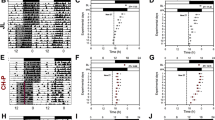Abstract
The present study tested the hypothesis that subjects with a good tolerance to shift work maintain the circadian period τ of their temperature rhythm equal to 24 h, while τ may differ from 24 h when subjects exhibit one or several clinical signs of intolerance. These latter are mainly: persisting sleep disturbance, persisting fatigue, changes in mood and behaviour, and digestive troubles, from gastritis to overt peptic ulcer1,2. These symptoms were used here to classify the subjects studied. Medications, including all types of sleeping pills, are ineffective. As was the case in the present study, some subjects may tolerate shift work for 35 yr, reaching 57 yr of age without complaint, while others, after several months or many years, quite rapidly (within 6 months) develop symptoms of intolerance1.
This is a preview of subscription content, access via your institution
Access options
Subscribe to this journal
Receive 51 print issues and online access
$199.00 per year
only $3.90 per issue
Buy this article
- Purchase on Springer Link
- Instant access to full article PDF
Prices may be subject to local taxes which are calculated during checkout
Similar content being viewed by others
References
Andlauer, P., Reinberg, A., Fourre, L., Battle, W. & Duverneuil, J. Physiol., Paris 75, 507 (1979).
Koller, M. et al. in Night and Shift work: Biological and Social Aspects (eds Reinberg, A., Vieux, N. & A Andlauer, P.) 465–472 (Pergamon, Oxford, 1981).
Reinberg, A. & Smolensky, M. in Body Temperature: Control in Health and Diseases and the Effects of Drugs (eds Lomax, P. & Schonbaum, E.) Pharmac. Ther. 22, 425–464 (Pergamon, Oxford, 1983).
Wever, R. A. The Circadian System of Man. Results of Experiments under Temporal Isolation (Springer, New York. 1979).
De Prins, J. & Malbecq, W. Bull. Cl. Sci. 69, 287–294 (1983).
Aschoff, J. & Wever, R. A., Fedn Proc. 35, 2326 (1976).
Weitzman, E. D., Czeisler, C. A. & Moore-Ede, M. C. in Advances in Sleep Research Vol. 7 (eds Johnson, L.C., Tepas, D.I., Colquhoun, W. P. & Colligan, M. J.) 75–91 (S. P. Medical and Scientific, New York, 1981).
Author information
Authors and Affiliations
Rights and permissions
About this article
Cite this article
Reinberg, A., Andlauer, P., Prins, J. et al. Desynchronization of the oral temperature circadian rhythm and intolerance to shift work. Nature 308, 272–274 (1984). https://doi.org/10.1038/308272a0
Received:
Accepted:
Issue Date:
DOI: https://doi.org/10.1038/308272a0
This article is cited by
-
Sleep-wake rhythm and physical fitness in relation to activities of daily living in stroke survivors residing at home
Environmental Health and Preventive Medicine (1999)
-
Pattern of shift rota modulates oral temperature circadian rhythm and sleep-wakefulness profiles in shift workers
Journal of Biosciences (1997)
-
Time estimation circadian rhythm in shift workers and diurnally active humans
Journal of Biosciences (1994)
-
Alteration of period and amplitude of circadian rhythms in shift workers
European Journal of Applied Physiology and Occupational Physiology (1988)
Comments
By submitting a comment you agree to abide by our Terms and Community Guidelines. If you find something abusive or that does not comply with our terms or guidelines please flag it as inappropriate.



